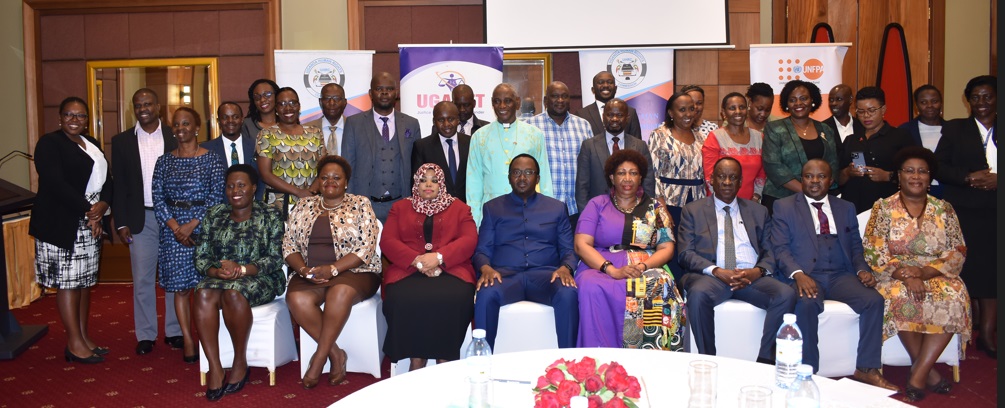
The Uganda Human Rights Commission held a high-level dialogue aimed at bringing several partners together to discuss the possibility of reviewing the Legal framework on the spread of HIV/Aids.
While officiating at this dialogue yesterday (July 11, 2023) at Sheraton Kampala, the Chairperson Hon. Mariam Wangadya underscored the need to ensure that the national legal and policy framework is human rights compliant.
“When it comes to HIV/AIDS, it is important that we address issues of discrimination, stigmatization and a conspiracy of silence which continue to fuel this pandemic and drastically hamper our prevention efforts. We have to ensure that our legal and policy framework on HIV/AIDS are human rights compliant, “the UHRC Chairperson noted.
“We cannot continue being neutral on inequalities whether in law or practice. We need to end the inequalities in the enjoyment of rights particularly for people leaving with HIV and those vulnerable to or afflicted by HIV. To get back on truck on ending HIV/AIDS, we must confront those inequalities,” she added.
The key partners at this dialogue were Uganda Network on Law Ethics and HIV/AIDS (UGANET), United Nations Population Fund (UNFPA), the Uganda law Reform Commission and the Aids Support Organization (TASO).
The Board Chairperson UGANET Sen. Counsel Sarah Babirye Lubega appreciated the Commission for partnering with her organization and providing resources particularly for organizing this event. She mentioned the founders of UGANET who included Justice Solome Bbosa and Supreme Court Justice Dr Esther Kisakye.
The CEO Grace Nayiga revealed that every year, UGANET holds a dialogue to advocate for reforms in the law and it was at one of those dialogues last year that the issue of holding this high-level dialogue was fronted. She revealed that UGANET worked with the UHRC at the time when the HIV/AIDS law was still a Bill in Parliament.
“The leaders then sat together and laid strategies to push back the law to ensure that it will be passed without infringing on the rights of people living with HIV. Unfortunately, the law was passed with 90% positives but with clauses that we feel are targeting communities of people living with HIV/AIDS. So, we have been on a journey as an organization to ensure that we get all stakeholders involved to address the gaps in the law and up to this day we are still on that journey,” she said.
She said they believe that with the tripartite relationship with the UHRC and the Law Reform Commission they will have great results.
Senior Counsel Paul Mukiibi moved a keynote address highlighting key sections in the HIV/AIDS Act which infringe the Constitution or which did not put into account scientific discoveries. He said they presented all these issues about the Act when they challenged it in the Constitutional Court but the judges didn’t pick their mind. He particularly pointed out a section which make it mandatory for a medical officer to reveal results of a positive person to the people he/she closely associates with.
“There is no definition of what amounts to what one ‘closely associates with’ to which the medical personnel has to reveal the information. Is it to only family members, friends, the clan, classmates or fellow employees? The circle [one associates with] grows bigger because there is no limit to the number of people an individual can associates with,” he explained.
Rev. Can. Prof. Gideon Byamugisha who was the key discussant wondered why Uganda prefers to go for punitive laws rather than capability enhancement laws. He said currently safe behaviour and practices are difficult to adopt, they are unpopular and rare because the laws are coached to punish those who choose to practice safe behaviour.
“Unsafe behaviour are the easiest to practice, they are popular and people choose them easily. People say ogula otya sweet noginuunira mu kiveera (How do you buy a sweet and enjoy it unwrapped),” he said.
He gave a small anecdote of what often happens to him whenever he goes to buy condoms.
“The person [shopkeeper] first takes a gaze at my dog collar in awe. Then what I do, I first rush back [to the car] and switch off the engine because the Bible tells us not to lead others into sin. I then return to explain that I and my wife are HIV positive and the reason I am buying a condom is because we do not want to re-infect one another….,” he explained, noting that it will take people with courage like him to insist on doing what is right.
The highly attended Dialogue ended at 1:00pm with resolutions to fast-track the needed documentation with Law Reform Commission, the Office of the Director of Public Prosecution and the Parliamentary Committee on HIV/AIDS to quicken the proposed amendments.
